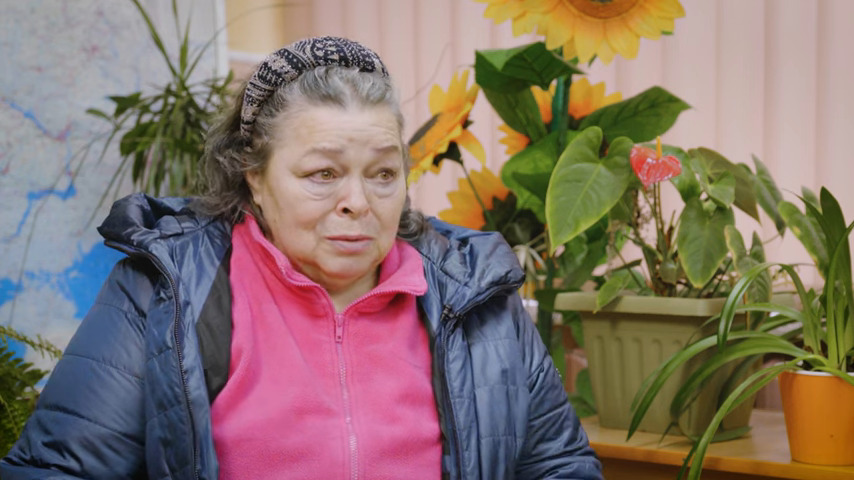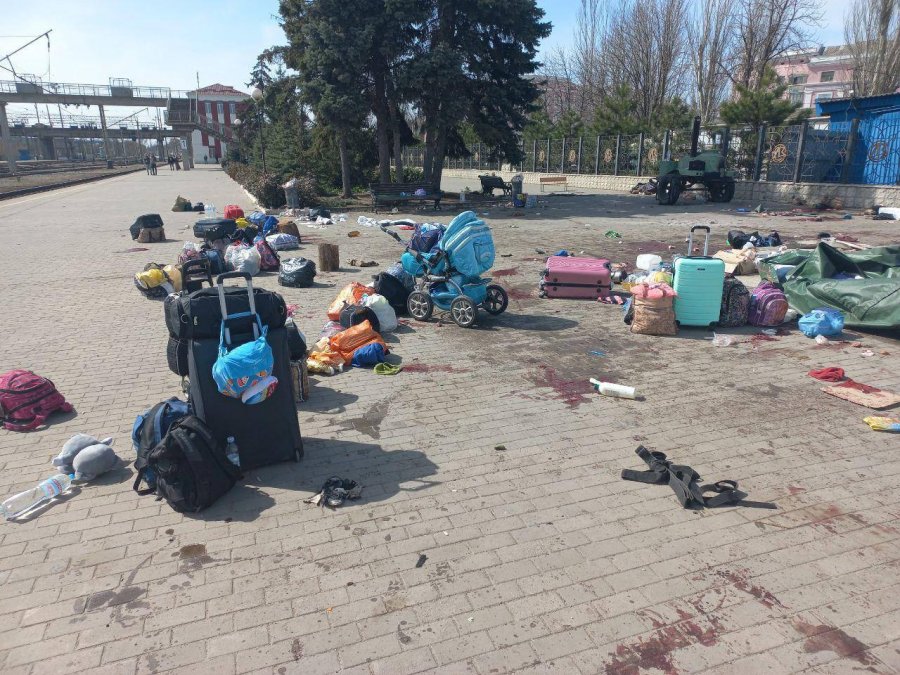— My name is Halyna Ivanovna. I am from the city of Sloviansk in the Donetsk region. We evacuated to the Lviv region in April because it was already terrifying. My daughter is sick, and she is disabled. She was afraid of explosions and planes because she remembered the events of 2014 when we hid her in the cellar. My elderly mother lived through the first month of the war.
— How did the war of 2022 burst into your life?
— There is an airfield in Kramatorsk. We could see the field. When the explosions began, we understood everything. We were on the outskirts of the city in the private sector. I have an apartment in the center, but my mother was afraid and needed help. My daughter was also scared. I didn’t know who to rescue first. We had a cellar, but only two meters deep. It would not have saved us, and most likely, we would be buried there. I kept a shovel and a crowbar in case I had to dig out.
There were crackers and water. All as advised. Since the child had already experienced all this horror, I hid her in the corner. There, two doors converged, and a bag of flour stood. I told her: “Sit down.” When we heard explosions, I would cover her with a jacket, close the doors, and she would sit there, crying like a mouse in a hole.
I took an ax and a large knife from my dad’s garage to bring and hide them in the house. I thought: “If someone climbs through the window or somewhere else, I would kill at least one or two.” I was so angry at them because they turned my life upside down.

— How was your evacuation from the city?
— Mom died in March, and we buried her. It was challenging to get to the cemetery because there were explosions, and very few people agreed to go. However, the grave pit had to be dug. I said: “Well, let it be more expensive, guys, but dig. I won’t leave her.” They buried my mother, and nine days later, I called my godson and said I would leave because I couldn’t stand it anymore. And the daughter needs to be moved because she will get worse, and I can’t do it alone. And I won't forgive myself if she stays. So we left on the fifth. And on the eighth, the Russians bombed Kramatorsk.
It was terrible. People got scared, and we could not get on the train either at 15:00 or at 18:00. An additional train was given, but the road ahead in Barvinkovo was bombed.
The train stood in the dark. We left only at ten o’clock at night. We ran to the train, but there was no light around. “Move on, move on — this car is busy.” While running, I fell and injured my knee. Scenes from old war movies were before my eyes, where people loaded the trains. The girls from Kharkiv told me that some rode in wagons where the convicts used to be transported. They were put in cages because there were no other places, so they rode. There were six of us all together as the goddaughter took her family.
There were many people, but they helped us because the mothers with children and the invalids had priority. I can't even imagine what was going on in Kramatorsk that day. This is how we left.

— Have you witnessed the destruction of civilian facilities?
— Shells flew into the streets and hit houses. Fragments flew, the slate was broken, and windows in my mother’s house were broken. My apartment was on the ninth floor, and the windows were also damaged. One was sealed with cellophane, and it was impossible to get to the rest.
— Have you witnessed civilian casualties?
— One man had a garage next to mine. He worked as a driver. He and his wife wanted to evacuate, but they came into the house together, and the door was knocked out. Then, a shell fragment hit her in the heart. His leg was torn off, but he was rescued while the woman died. We knew them. People on neighboring streets were dying in their homes. There is such an expression: “Bullet is dum.” And this was a dum shell. We all walk under God, and always, you think: has your time come or not? A bomb fell in front of the house, and it banged so! It's good that nothing exploded; otherwise, there would be no building. But we had already left by then; it happened a week later. Sometimes people were driving a car, and shells fell on them.
They say the woman was driving, and she was killed by shrapnel. She worked as a nanny in a kindergarten.
My friends live in Izium. According to the news, they said that the Russians went there. I called her and asked: “How are you? ” And she answered: “They shot all night. We locked ourselves in the bathroom with my daughter so we would not be cut by the glass that flew out of the windows. The phone is out of power, and I don’t know when I could call back.” And that’s it. We contacted her again before the New Year. She is now in Germany for treatment. She said they stayed in the basement until May.
She saw the bread only after they left and before they ate the dandelions. She took dandelions, washed them in rainwater, salted them, washed away bitterness, and poured oil over them. She told me sunflower oil was worth its weight in gold. But, unfortunately, almost nothing could be bought. And whatever was available was sold at exorbitant prices. And so it was. They found a mass grave for 500 people. She said there were seven such burials in the city. She also said that some went to look for food and did not return.
— Have you had any problems accessing food?
— We got what was left in the village, but everything was sold out in the city because more people were there. Prices immediately skyrocketed. Because there were no supplies, and it is understandable. We knew we needed to stock up — we had a few packs of cereals, but you can’t buy everything. Pensions are small, and we needed money for drugs, for something else. Mom was sick. There was no water. They found something in the water, and it was scary to drink it. I had to buy it in a store. The electricity was turned off, and it wasn’t easy. It was impossible to go long distances.
— Was it possible to receive medical assistance during the hostilities?
— No, many doctors left. They are also living people, and they are frightened. It was unclear how long it would last in the early days. There were several doctors on duty, and that’s it. I needed medicines in ampoules, so I rode a bicycle. Mom groaned in pain: “Give me at least something.” I called the doctor, and he came, opened his purse, and said: “Look, I have nothing; I have nothing to give you.” I asked to do at least something, but he shook his head: “She will soon [die], and we cannot move her.” — Where can I get medicines? — Go to the hospital department, and buy something to relieve the pain. So, I would buy an ampoule in one place and two in another, bring it home and give her a shut.
— Did the events in Sloviansk affect the mental health of the child?
— She forgot a lot but said she didn’t want to go home. She remembers some moments. She starts crying as soon as she sees a video of her grandmother. There are little children here, they play, and she looks at the helicopter and points: “Put it away, I’m afraid!” She does not go to children if she sees this. Boys play with toy cars and airplanes, and I see her hiding in a corner.
Her fears remain. She cries and screams when she hears a siren. She is terrified.
It would seem nothing terrible, but she remembers everything from 2014. We let her down into the cellar, but she didn’t have the strength to get back up; her legs were weak to climb the stairs. I pulled from above, and my mother lifted her from below. Once, we barely pulled her out, and she said she no longer wanted to go to the cellar. She didn’t sleep well and woke up from any rustle, so I laid down next to her. We slept dressed to rush out if something happened, but she did not understand why we dressed her for sleeping. Once I said: “Get up quickly!" And she asked: “Why don’t Russians go home? These men are evil! Do they not have parents? Why don’t bad guys go home but do evil here?” I cried so much then! For her, her parents are the authorities.
— Do you plan to return home after the end of the war?
— The house is calling, and the earth is calling. I didn’t think I would leave. I want to go home. My parents are buried there. My house is there, but I don’t know…
 The article was prepared by the Kharkiv Human Rights Protection Group with the support of the "
The article was prepared by the Kharkiv Human Rights Protection Group with the support of the "


